- Joined
- Oct 9, 2007
- Messages
- 47,655 (7.44/day)
- Location
- Dublin, Ireland
| System Name | RBMK-1000 |
|---|---|
| Processor | AMD Ryzen 7 5700G |
| Motherboard | Gigabyte B550 AORUS Elite V2 |
| Cooling | DeepCool Gammax L240 V2 |
| Memory | 2x 16GB DDR4-3200 |
| Video Card(s) | Galax RTX 4070 Ti EX |
| Storage | Samsung 990 1TB |
| Display(s) | BenQ 1440p 60 Hz 27-inch |
| Case | Corsair Carbide 100R |
| Audio Device(s) | ASUS SupremeFX S1220A |
| Power Supply | Cooler Master MWE Gold 650W |
| Mouse | ASUS ROG Strix Impact |
| Keyboard | Gamdias Hermes E2 |
| Software | Windows 11 Pro |
Phison is arguably the most popular brand for SSD controllers in the client segment, but is turning more of attention to the vast enterprise segment. The company had been making first-party enterprise SSDs under its main marquee, but decided that the lineup needed its own brand that enterprise customers could better discern from the controller ASIC main brand. We hence have Pascari and Imagin. Pascari is an entire product family of fully built enterprise SSDs from Phison. The company's existing first-party drives under the main brand will probably migrate to the Pascari catalog. Imagin, on the other hand, is a design service for large cloud and data-center customers, so they could develop bespoke tiered storage solutions at scale.
The Pascari line of enterprise SSDs are designed completely in-house by Phison, feature their latest controllers, firmware, PCB, PMIC, and on-device power-failure protection on select products. The third-party components here are the NAND flash and DRAM chips, which have both been thoroughly evaluated by Phison for the best performance, endurance, and reliability, at their enterprise SSD design facility in Broomfield, Colorado. Phison already had a constellation of industry partners and suppliers to go around with, and the company's drives even power space missions; but the Pascari brand better differentiates the fully-built SSD lineup from the ASIC make. Pascari makes its debut with the X200 series high-performance SSDs for high-access heat data. The drive leverages Phison's latest PCIe Gen 5 controller technology, the most optimized memory components, and availability in all contemporary server storage form-factors.

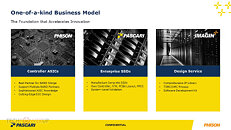
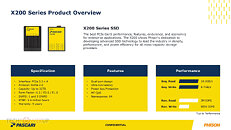
The Pascari X200 series performance SSDs target HPC, data-analysis, online transactions, and image recognition use-cases. It comes in the two most relevant form-factors—15 mm-thick U.2, and E3.S 1T. The drive comes in two sub-variants, the X200P, and the X200E. Capacities of the X200P range from 1.92 TB, all the way up to 30.72 TB. Both form-factor variants of the X200P take advantage of PCI-Express Gen 5, with the U.2 variant using a PCI-Express 5.0 x4 link, and the E3.S 1T using Gen 5 2x2 links. The X200E, on the other hand, comes in capacities ranging between 1.6 TB and 25.6 TB. It is the higher endurance variant of the two, which uses its NAND flash in a 2-bits per cell configuration, which lends it 3 DWPD endurance, as compared to the 1 DWPD of the X200P.
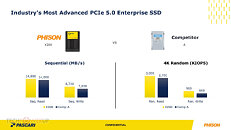
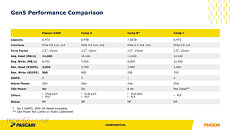
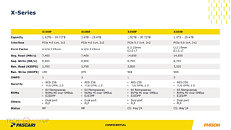
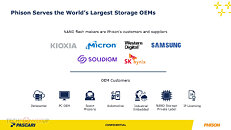
Both the X200P and X200E offer similar sequential- and random-access numbers, with up to 14,800 MB/s sequential reads, up to 8,700 MB/s sequential writes, up to 3 million IOPS 4K random reads, and up to 900,000 IOPS 4K random writes. The NVMe protocol on both drive series supports up to 64 namespaces, NVMe MI over SMBus, and end-to-end DPP. Security features on both include on-device AES-256 and TCG OPAL 2.0. Both the X200P and X200E are launching today.
Phison also took the opportunity to walk us through its entire portfolio of enterprise SSDs that will likely fill the Pascari catalog. Coming in from the top are the X-series high-performance SSDs for the use-cases we highlighted above; followed by the D-Series data-center SSDs targeting "warm" data storage on workstations, and network storage appliances. The S-series enterprise-grade SATA SSDs are meant for "lukewarm" bulk storage of social media, streaming media, and databases. The B-series of boot drive SSDs are meant to be used as server boot-drives holding their all important OS and operating environments. These come with server-grade reliability for extreme uptime operations. Lastly, there's the AI-series of SSDs optimized for AI GPU servers. There's no on-device compute, but the drive is meant to be used as virtual memory for GPUs.
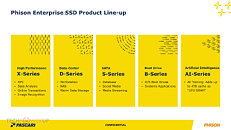
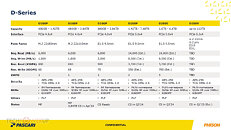
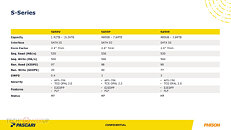
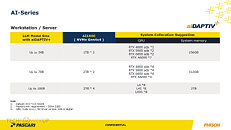
Lastly, Pascari detailed how it has presence across four continents, and in some of the most important IT markets, including the US, China, Japan, Taiwan, Singapore, India, the UK, France, Germany, and Italy. The company has working relations with nearly all NAND flash and DRAM suppliers, all leading server solutions providers, and the leading data-center tech companies.
The complete slide-deck from Phison follows.


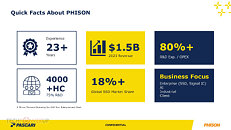
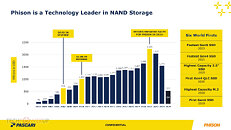
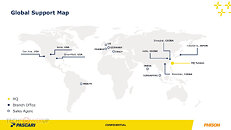


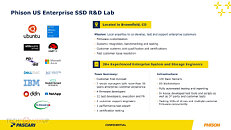
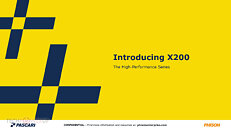








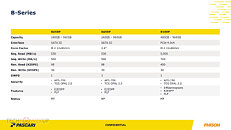

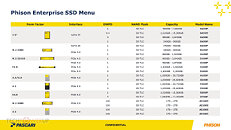

View at TechPowerUp Main Site
The Pascari line of enterprise SSDs are designed completely in-house by Phison, feature their latest controllers, firmware, PCB, PMIC, and on-device power-failure protection on select products. The third-party components here are the NAND flash and DRAM chips, which have both been thoroughly evaluated by Phison for the best performance, endurance, and reliability, at their enterprise SSD design facility in Broomfield, Colorado. Phison already had a constellation of industry partners and suppliers to go around with, and the company's drives even power space missions; but the Pascari brand better differentiates the fully-built SSD lineup from the ASIC make. Pascari makes its debut with the X200 series high-performance SSDs for high-access heat data. The drive leverages Phison's latest PCIe Gen 5 controller technology, the most optimized memory components, and availability in all contemporary server storage form-factors.



The Pascari X200 series performance SSDs target HPC, data-analysis, online transactions, and image recognition use-cases. It comes in the two most relevant form-factors—15 mm-thick U.2, and E3.S 1T. The drive comes in two sub-variants, the X200P, and the X200E. Capacities of the X200P range from 1.92 TB, all the way up to 30.72 TB. Both form-factor variants of the X200P take advantage of PCI-Express Gen 5, with the U.2 variant using a PCI-Express 5.0 x4 link, and the E3.S 1T using Gen 5 2x2 links. The X200E, on the other hand, comes in capacities ranging between 1.6 TB and 25.6 TB. It is the higher endurance variant of the two, which uses its NAND flash in a 2-bits per cell configuration, which lends it 3 DWPD endurance, as compared to the 1 DWPD of the X200P.




Both the X200P and X200E offer similar sequential- and random-access numbers, with up to 14,800 MB/s sequential reads, up to 8,700 MB/s sequential writes, up to 3 million IOPS 4K random reads, and up to 900,000 IOPS 4K random writes. The NVMe protocol on both drive series supports up to 64 namespaces, NVMe MI over SMBus, and end-to-end DPP. Security features on both include on-device AES-256 and TCG OPAL 2.0. Both the X200P and X200E are launching today.
Phison also took the opportunity to walk us through its entire portfolio of enterprise SSDs that will likely fill the Pascari catalog. Coming in from the top are the X-series high-performance SSDs for the use-cases we highlighted above; followed by the D-Series data-center SSDs targeting "warm" data storage on workstations, and network storage appliances. The S-series enterprise-grade SATA SSDs are meant for "lukewarm" bulk storage of social media, streaming media, and databases. The B-series of boot drive SSDs are meant to be used as server boot-drives holding their all important OS and operating environments. These come with server-grade reliability for extreme uptime operations. Lastly, there's the AI-series of SSDs optimized for AI GPU servers. There's no on-device compute, but the drive is meant to be used as virtual memory for GPUs.




Lastly, Pascari detailed how it has presence across four continents, and in some of the most important IT markets, including the US, China, Japan, Taiwan, Singapore, India, the UK, France, Germany, and Italy. The company has working relations with nearly all NAND flash and DRAM suppliers, all leading server solutions providers, and the leading data-center tech companies.
The complete slide-deck from Phison follows.





















View at TechPowerUp Main Site


